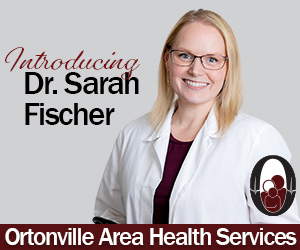
 Dr. Robert Ross, a physician at Ortonville Area Health Services for 42 years, is the 2019 recipient of the Lifetime Achievement Award from the Minnesota Department of Health – Office of Rural Health and Primary Care and the Minnesota Rural Health Association. Dr. Ross – more commonly known as Dr. Bob – received his award in Duluth on June 18. The criteria for the award stipulates a recipient must be a dedicated health care professional who has made lasting and significant contributions to the health and well-being of a rural community.
Dr. Robert Ross, a physician at Ortonville Area Health Services for 42 years, is the 2019 recipient of the Lifetime Achievement Award from the Minnesota Department of Health – Office of Rural Health and Primary Care and the Minnesota Rural Health Association. Dr. Ross – more commonly known as Dr. Bob – received his award in Duluth on June 18. The criteria for the award stipulates a recipient must be a dedicated health care professional who has made lasting and significant contributions to the health and well-being of a rural community.
Dr. Bob began his career in Ortonville in July 1977, the Monday after he completed his family medicine residency. It proved helpful Dr. Bob had grown up in Ortonville as he already understood the community is your family and specialization is nice, but in the country, it’s not always possible. You wear a lot of hats: primary physician, surgeon, counselor, senior partner, and Big Stone County Coroner are just some of the titles he has held.
The list goes on, and so did Dr. Bob until, in 1989, he took a look around and saw rural health care was ailing and without preventative measures it would be failing. He decided to write another prescription designed to insure the longterm vitality of healthcare in Ortonville. His regimen included his partners and the birth of the Big Stone Area Health Foundation.
 For 30 years, the foundation has financially assisted thousands of students who are working to obtain health care degrees and allowed OAHS to recruit highly-qualified members to their team. Early in his career, Dr. Bob had encouraged and sponsored nurses in the pursuit of nurse practitioner education. The foundation continues this work. Dr. Bob also continues to sponsor a scholarship awarded to the top science student in each graduating class at Ortonville High School.
For 30 years, the foundation has financially assisted thousands of students who are working to obtain health care degrees and allowed OAHS to recruit highly-qualified members to their team. Early in his career, Dr. Bob had encouraged and sponsored nurses in the pursuit of nurse practitioner education. The foundation continues this work. Dr. Bob also continues to sponsor a scholarship awarded to the top science student in each graduating class at Ortonville High School.
His son says, “He’s not a fast talker and he doesn’t try to manipulate people. He walks the walk and people sense that.” One of his colleagues is a prime example: In 1978, Dr. Bob delivered a healthy baby girl named Stacy. Dr. Stacy Longnecker became the first female partner at OAHS, and she cites Dr Bob as instrumental in her decision to become a physician.
Stacy recalled while she was a teenager, her close friend died of cancer. As she watched Dr. Bob take care of her friend, she made the decision to become a physician in hopes of curing cancer. She says the way she thinks as a physician was greatly influenced by Dr. Bob, too. While she was in medical school, her mother also succumbed to cancer. Dr. Bob served as her mother’s physician and Stacy says she witnessed the two conduct “compassionately honest conversations.” She heard Dr. Bob ask her mother, “Is there anything you still need to do or say while here on Earth? Anyone you need to talk to who isn’t here?” She says these acts of honesty and caring were something she knew she wanted to incorporate in her work and something she was never taught in medical school.
Dr. William Hoffman also credits Dr. Bob with influencing his opinions of health care. As a medical student at Georgetown University, Hoffman worked in Ortonville to complete his medical rotation with Dr. Bob. He watched Dr. Bob care for a longtime patient in her home. She had been in hospice for a week, when her family phoned to request Dr. Bob look after her at their home, and Dr. Bob graciously agreed. Dr. Hoffman said, “While a large medical facility might have offered state-of-the-art technology and interventions, the patient was better off in her rural community…that had a well-supported hospital and family physicians who had spent their careers in the community.”
Dr. Bob hasn’t shortchanged his own family, either. He’s a dedicated husband, father, foster parent, and church member. His wife, Mary, says he always encouraged her to pursue her own interests. And, Mary says,” He is the kind of dad who would drive the car into the backyard so the headlights could extend the fun the neighbor kids were having playing football. He attended all our sons’ sporting events and concerts.”
Dr. Bob’s son agrees, “I never once thought Dad’s work interfered with him prioritizing us kids.” Dr. Bob’s before-school basketball program is another example of his ability to spread the wealth. Every school morning from 6:30 a.m. until 8 a.m. for seven years he supervised basketball practice to encourage kids to stay busy and physically fit. It was a way for him to spend more time with his own young sons, but he also ended up reaching hundreds of other children.
He chaperoned, coached, and provided transportation to area basketball tournaments. He provided athletic camp scholarships and volunteered as a referee. (You might remember seeing him at the gym in his surgical scrubs.) He sponsored and chaperoned high school basketball and golf teams to Arkansas, Nebraska, New Mexico, New York, Texas, and Wyoming. Plus, he volunteered as the sideline physician at Trojan football games.
Somehow, Dr. Bob manages all this while seeing patients five days a week, delivering 1472 babies, and mentoring students from the University of Minnesota Medical School Rural Physician Associates Program and the University of North Dakota’s Rural Opportunity Medical Education.
Dr. David Collins, partner and former student, sums it up by saying,” Dr. Bob lives, breathes, and doctors Ortonville.”
See for yourself. Pick a day, any day. You’ll find Dr. Bob, dressing a wound, consoling a patient’s family, buying scrubs for an employee who can’t afford them, walking an elderly patient to their car, or even knocking on a door to make an old-fashioned home visit, and occasionally he eats and sleeps. We’re just not sure when.
Submitted picture: Dr. Bob with his grandson Cane Ross accepting the award in Duluth.
Bottom picture is Dr. Bob speaking at this years annual community picnic celebrating the 30th Anniversary of the Foundation.












No comments so far.
Be first to leave comment below.